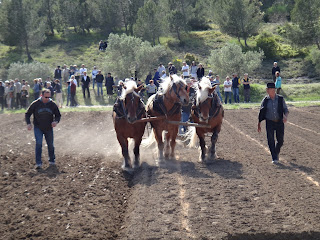Real
strength comes from those who in front of the mighty use a velvet glove. Something
i have noticed. The smaller the sentient being the less respect people tend to
have. Too often you see people pulling & dragging little ponies around
but not often do you see them doing the same with a
1 ton animal attached at the
end of the lead rope. Size should not make any difference. Consideration comes regardless of the sentient being’s size. When
dealing with the heavies, somehow the majority of horsemen i have came across
tend to dig somewhere else than coercive methods for answers. This is one of
the reasons i have always been drawn to the world of heavies. Not to say that
the wisdom of an old man is an attraction!
.JPG) |
| A team of European champions! |
The 9 breeds of heavy French horses were also represented.
 |
| Ardonnais stand between 160 and 162 cms |
 |
| Auxois measure between 160 and 170 cms |
 |
| Boulonnais 80% grey, 10% Chestnuts & 10% Black |
 |
| Bretons stand between 155 and 163 cms |
 |
| Breton |
 |
| A pair of Comtois at work. The turn at the end of the plough was very nicely manoeuvred with calm & precision. Bravo! |
 |
| Cob Normand stands between 158 and 171 cms. It is the lightest of the French heavies. Often seen in mounted police force. |
Representing the Percheron breed, i let you enjoy this beautiful dressage moment between Manolo and his 1 toner stallion, Tao. Tao was a present from the Harras Nationaux, the French national Stud.
 |
| Poitevin Mulassier stands between 160 and 175 cms. It originates from the Poitou area of France. Often crossed with Baudet du Poitou to produce heavy working mules. |
 |
| Trait Du Nord stands betwwen 168 and 170 cms. |
These
days, heavy horses are used in sport & leisure driving, logging (34.5
million cubic metres of wood are cleared in France per year of which 50,000
cubic metres or 0.15% of the total volume cleared by horses.), traction (A horse can provide a maximum force of a
value equal to its own weight for 15 seconds. One horse power (HP) equals 35kg
of force which is the average force developed by a heavy horse 7 hours a day, 6
days a week, 52 weeks a year.), ploughing (Modern time is preoccupied by the
respect of its environment: less pollution, respectful of the soil and more
economical over small areas, the horse is the most modern tool there is!), urban
draft horse (73% of the French (SOFRES survey - National stud farms - 2003)
would like to see horses return to their town to provide physical therapy for the
disabled,
to monitor
parks and rubbish,
to offer
training
to delinquents to learn
self-control and discipline, to offer tours of the town and to assist
the police force. Around 30 French towns and communities
already
use one or more horses.) and in vineyard work.
For the horse & wine lovers of this world, horses are more and more used in vineyard work hooray! Horses first made a comeback to the vineyard as ‘main assistant’ (to bring buyers into the vineyards and perform demonstrations of ‘old-style’ wine harvesting), but the wine growers quickly realised there was a notable improvement to the health of the vineyard. Horses are synonymous with quality. In Burgundy, 11 service providers work with horses on different domains.
Vincent introduced me to his friend Dago who let me drive his 800kg Comtois. This was a very first for me. i drove the horse with feel in the reins and voice. An amazing first experience of driving a horse and to feel how responsive the horse was to the weight I put into my reins.
For the horse & wine lovers of this world, horses are more and more used in vineyard work hooray! Horses first made a comeback to the vineyard as ‘main assistant’ (to bring buyers into the vineyards and perform demonstrations of ‘old-style’ wine harvesting), but the wine growers quickly realised there was a notable improvement to the health of the vineyard. Horses are synonymous with quality. In Burgundy, 11 service providers work with horses on different domains.
 |
| A discovery for me, Rose Grapefruit! It is a rose wine with grapefruit sirop. In France we call it Rose Pamplemouse...Delicious! |
 |
| Dago, the 800kgs Comtois & the chart i drove. Notice the 5 kids at the back. They were there when i drove...no pressure! |
 |
| A multitude of different horse shoe on display on this table. |
 |
| A shoe made to give a larger platform for soft ground. |
 |
| Another team with Comtois. |
 |
| In-line carriage will have the strongiest animal immediately in front of the carriage. Because in a turn, it would be up to this horse to pull the whole weight of the carriage for a few second. |
 |
| A team of 3 Comtois ploughing. |


No comments:
Post a Comment